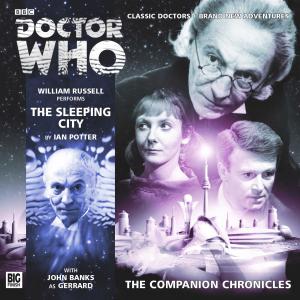The Sleeping City
Friday, 27 June 2014 - Reviewed by

The Sleeping City
Produced by Big Finish
Written by Ian Potter
Directed by Lisa Bowerman
Released: Feburary 2014
Doctor Who in the mid-1960s toyed with espionage stories - The Reign of Terror for one - but its early evening slot probably deterred programme-makers from blatantly acknowledging that the adventures of the Doctor and his friends addressed Cold War paranoia. The Sleeping City finds Ian Chesterton in the hands of the secret service, who find his sudden reappearance and that of Barbara Wright nearly two years after they vanished from London needs urgent explanation. For reasons at first obscure to the listener though already explicit with hindsight, the key to the release of Ian and Barbara lies in the tale of their visit with the Doctor and Vicki to the city of Hisk.
One of the features of The Companion Chronicles has been the point in time from which the narrating companion's voice has come. Many seem to look back from late in life at a remote time, but here William Russell is from the start evidently narrating from the point of view of an Ian much, much closer to the one we saw on television. It's down to Russell's performance that we accept this, more than the line that Ian is 'rather dry' and needs a glass of water; this is an older man's voice which can project if not the energy of someone younger, then the memory of it. Rather than impersonate Maureen O'Brien, Russell's Vicki is a high voice emanating distantly from somewhere near his elbow; and the Doctor is Russell's first Doctor owing something to Hartnell only in the sense that this is a performance with an obvious grandfather. John Banks is a judiciously versatile agent Gerrard and various residents of Hisk, mastering the doubtful, the doughtily doubtless and the magnifier of self-doubt.
Ian Potter's writing and William Russell's delivery evoke the poetic quality of many of those avant-garde Lambert- or Wiles-produced Doctor Whos. There is a beautiful explanation of the workings of the TARDIS: quicksilver and the power of the Sun, and valves and magic. The lived fiction of society on Hisk is etched in details - the market where everything is the same price and there is no shortage or oversupply, the sluicing tubes which dispose of out-of-date goods, the bell calling everyone to 'limbus' - rather like the air raid warning summoning the Eloi to their doom in George Pal's The Time Machine - and the limbus dream-shields one can imagine as props designed by Raymond Cusick, Barry Newbery or John Wood. There are nods towards emergent psychedelia, much as there were in stories such as The Daleks, Inside the Spaceship or The Web Planet, but developed now to tell a Cold War story with an emphasis on the nature of society and manipulation of the individual at an unconscious level. There are echoes of The Ipcress File and The Prisoner rather than Doctor Who's more common fear of the bomb and memories of the Second World War, though listeners might find some parallels, though inexact ones, between Hisk and the Sense-Sphere of The Sensorites. Misguided self-regulation, though, is a theme with applications in other time periods too; keeping everything stable and safe prevents innovation and risk and sets limits to imagination.
So much for another Brave New World; but the trick of the story is that while explaining how all was lost, it turns out to have been about making everything better, without necessarily assuming that our protagonist comes from the best of all possible worlds.The Sleeping City is a story for William Russell and Ian Chesterton fans not just because of Russell's ever-reliable performance with a capacity still to surprise, but because it manages to be about Ian's perception of his environment and companions, without needing to invent or import detail unavailable to or unimaginable by the viewer of 1963-1965. It's also for those who like fiction which toys with its audience's and its characters' understanding of events while still presenting a solid narrative thread, while leaving them to imagine what the sleeping city itself will be like when it awakes.







